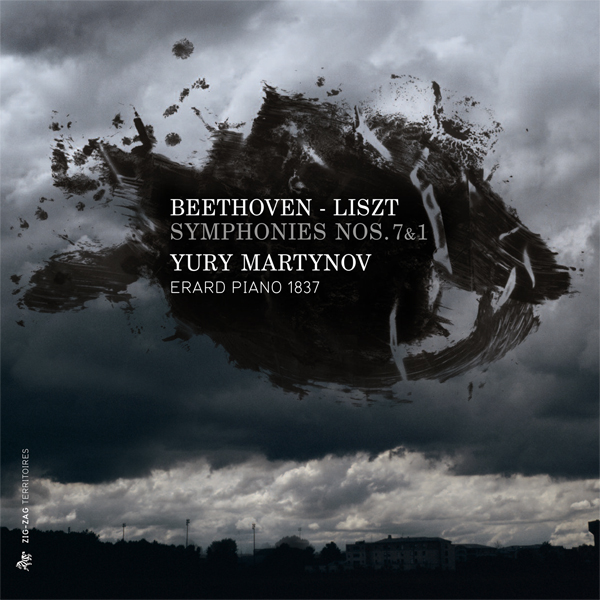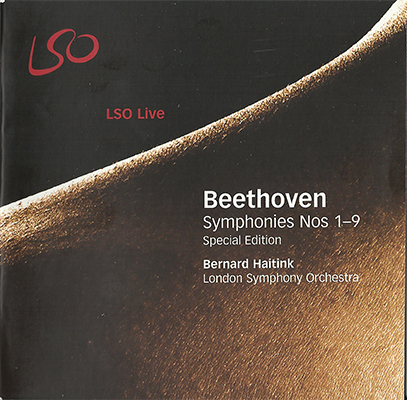
Beethoven-Liszt – Symphonies Nos. 7 & 1 – Yury Martynov (2013)
FLAC (tracks) 24-bit/88,2 kHz | Time – 01:07:36 minutes | 971 MB | Genre: Classical
Studio Master, Official Digital Download – Source: Qobuz | Digital Booklet | © Zig-Zag Territoires / Outhere Music
Recorded: 17 to 21 september 2012 in Doopsgezinde Gemeente Church, Haarlem, Netherlands
The Russian pianist Yury Martynov presents here the second volume of the complete recording he has undertaken of the cycle of the Beethoven symphonies as transcribed for the piano by Franz Liszt. For both the pianist and his listeners, this recording constitutes a genuine adventure, combining the creative genius of Beethoven, the inspired vision of these works of the composer and pianist Franz Liszt, and a piano with the same sonic resources as were available to Liszt.
Here is what Liszt had to say about the piano as a medium of transcription: ‘In the compass of its seven octaves, it can produce, with only a few exceptions, all the characteristics, all the combinations, all the most learned compositional figures, and leaves the orchestra no other advantages than those . . . of diversity of timbre and massed effects.’
For these two symphonies, Yury Martynov has chosen the same Érard piano of 1837 on which he recorded the first volume of this series. That CD – Symphonies nos.6 and 2 / ZZT 301 – received a particularly warm welcome from the press (‘Choc’ de Classica, May 2012).
We’ve had a few good recordings of the Beethoven symphonies as arranged for piano by Franz Liszt, but Yury Martynov’s project is – to my knowledge – the first on period instruments. It’s certainly a welcome change of pace as long as Martynov keeps selecting pianos as good as this 1837 Erard, which has a pretty full and clear sound that shouldn’t irk many modern-instrument enthusiasts. It approaches the orchestral qualities Liszt desired; the bass is especially satisfying.
It’s been very common for pianists to compensate for the smaller sound by playing more quickly. Pianos can’t sustain notes the way that stringed instruments can, so a lot of Beethoven’s writing, transcribed for piano, benefits from being played like piano music. Yury Martynov bucks this trend, turning in performances slower than many orchestral ones. The Seventh symphony’s allegretto is 9:34 here; compare to Kleiber’s 8:09 or Karajan’s 8:01 (1962).
Martynov has a more romantic sensibility, stripping the First Symphony of its post-Haydn classicism. It’s ironic, given his background in early music and continuo performance, but Martynov takes many a creative liberty – consider the big slowdown for a hushed, heavily pedaled reading of the third-movement trio, or the long suspenseful pauses as the finale begins. Honestly, I find the expansiveness and soft touch detrimental in the First; this is a piece and an arrangement that could use a little classical rigour and sharpness.
The same qualities which give me pause in the First Symphony contribute to an excellent performance of the Seventh. Though virtuosity is on full display in the fast movements, it’s Martynov’s hypnotically slow, funereal tread in the allegretto and his light, jovial way with the scherzo that stick in my memory. His is a performance that really uses the piano, and specifically this period instrument, to maximum effect.
The booklet offers helpful discussion about what changes Liszt had to make during the transcription process, even if it frames the discussion in the context of Freudian analysis. The sound is good and the piano, as mentioned, a joy to hear; if I liked this less than Martynov’s first volume, it’s because the rather sleepy First Symphony performance doesn’t live up to the vitality of the other three works he’s recorded. The Seventh is a reading that would enrich any collection. -Brian Reinhart , MusicWeb International
Tracklist:
Ludwig van Beethoven (1770-1827)
Transcribed for Piano by Franz Liszt (1811-1886)
Symphony No. 7 in A Major, Op. 92
1 I. Poco sostenuto 13:49
2 II. Allegretto 9:37
3 III. Scherzo – Presto 9:13
4 IV. Allegro con brio 8:27
Symphony No. 1 in C Major, Op. 21
5 I. Adagio molto – Allegro con brio 8:54
6 II. Andante cantabile con moto 8:01
7 III. Menuetto – Allegro molto e vivace 3:26
8 IV. Adagio – Allegro molto vivace 6:13
Personnel:
Yury Martynov, piano
Piano Erard 1837 (Edwin Beunk Collection)
Download:
mqs.link_BeethvenLisztSymphniesNs.71YuryMartynv201388.224.part1.rar
mqs.link_BeethvenLisztSymphniesNs.71YuryMartynv201388.224.part2.rar




















![Beethoven-Liszt - Symphony No. 9 - Yury Martynov (2016) [Qobuz FLAC 24bit/88,2kHz] Beethoven-Liszt - Symphony No. 9 - Yury Martynov (2016) [Qobuz FLAC 24bit/88,2kHz]](https://getimg.link/images/imgimgimg/uploads/2017/03/lXkOI3l.jpg)
![Beethoven-Liszt - Symphonies Nos. 3 & 8 - Yury Martynov (2014) [Qobuz FLAC 24bit/88,2kHz] Beethoven-Liszt - Symphonies Nos. 3 & 8 - Yury Martynov (2014) [Qobuz FLAC 24bit/88,2kHz]](https://getimg.link/images/imgimgimg/uploads/2017/03/NpbXokS.jpg)
![Beethoven-Liszt - Symphonies Nos. 4 & 5 - Yury Martynov (2015) [Qobuz FLAC 24bit/48kHz] Beethoven-Liszt - Symphonies Nos. 4 & 5 - Yury Martynov (2015) [Qobuz FLAC 24bit/48kHz]](https://getimg.link/images/imgimgimg/uploads/2017/03/JxnxVAn.jpg)
![Valentina Lisitsa - Tchaikovsky: The Complete Solo Piano Works (2019) [FLAC 24bit/96kHz] Valentina Lisitsa - Tchaikovsky: The Complete Solo Piano Works (2019) [FLAC 24bit/96kHz]](https://getimg.link/images/imgimgimg/uploads/2020/01/VQQ62Jx.jpg)
![Carl Nielsen - Symphonies Nos. 1-6 - London Symphony Orchestra, Sir Colin Davis (2015) [Blu-Ray Pure Audio Disc + DSF Stereo DSD64/2.82MHz] Carl Nielsen - Symphonies Nos. 1-6 - London Symphony Orchestra, Sir Colin Davis (2015) [Blu-Ray Pure Audio Disc + DSF Stereo DSD64/2.82MHz]](https://getimg.link/images/imgimgimg/uploads/2015/09/Wnf48VE.jpg)
![Andras Schiff - Beethoven: Diabelli-Variationen, Op. 120 (2013) [HDTracks FLAC 24bit/44,1kHz] Andras Schiff - Beethoven: Diabelli-Variationen, Op. 120 (2013) [HDTracks FLAC 24bit/44,1kHz]](https://getimg.link/images/imgimgimg/uploads/2017/02/Zuaqo6e.jpg)

![Glenn Gould - The Complete Columbia Album Collection (2015 Remastered Edition) [Qobuz FLAC 24bit/44,1kHz] Glenn Gould - The Complete Columbia Album Collection (2015 Remastered Edition) [Qobuz FLAC 24bit/44,1kHz]](https://getimg.link/images/imgimgimg/uploads/2017/07/2bHwfbA.jpg)
![Pacifica Quartet - Dmitri Shostakovich and his Contemporaries: The Soviet Experience Vol. 1-4 (2011-2013) [24bit FLAC] Pacifica Quartet - Dmitri Shostakovich and his Contemporaries: The Soviet Experience Vol. 1-4 (2011-2013) [24bit FLAC]](https://getimg.link/images/imgimgimg/uploads/2017/07/ntIbtOp.jpg)
![Alexander Krichel - An die ferne Geliebte (2019) [FLAC 24bit/96kHz] Alexander Krichel - An die ferne Geliebte (2019) [FLAC 24bit/96kHz]](https://getimg.link/images/imgimgimg/uploads/2019/08/9U1Aqux.jpg)
![Sir Simon Rattle, Berliner Philharmoniker - Jean Sibelius - Symphonies Nos. 1-7 (2015) [Blu-ray Disc + Pure Audio Blu-ray Disc + FLAC 5.1 24bit/192kHz] Sir Simon Rattle, Berliner Philharmoniker - Jean Sibelius - Symphonies Nos. 1-7 (2015) [Blu-ray Disc + Pure Audio Blu-ray Disc + FLAC 5.1 24bit/192kHz]](https://getimg.link/images/imgimgimg/uploads/2016/02/htbd2jO.jpg)
![Max Emanuel Cencic - Handel: Ottone, HWV 15 (2017) [Qobuz FLAC 24bit/96kHz] Max Emanuel Cencic - Handel: Ottone, HWV 15 (2017) [Qobuz FLAC 24bit/96kHz]](https://getimg.link/images/imgimgimg/uploads/2017/11/9uXCAkQ.jpg)
![Netherlands Radio Philharmonic Orchestra, James Gaffigan, Ingo Metzmacher, Christoph Poppen, Michael Schonwandt, Markus Stenz, Osmo Vanska - Karl Amadeus Hartmann: Symphonies Nos. 1-8 (2014) [nativeDSDmusic DSF DSD64/2.82MHz] Netherlands Radio Philharmonic Orchestra, James Gaffigan, Ingo Metzmacher, Christoph Poppen, Michael Schonwandt, Markus Stenz, Osmo Vanska - Karl Amadeus Hartmann: Symphonies Nos. 1-8 (2014) [nativeDSDmusic DSF DSD64/2.82MHz]](https://getimg.link/images/imgimgimg/uploads/2019/01/xUV4HwU.jpg)
![Nelson Goerner - Debussy: Etudes Book II, Images Book I, Estampes (2013) [Qobuz FLAC 24bit/88.2kHz] Nelson Goerner - Debussy: Etudes Book II, Images Book I, Estampes (2013) [Qobuz FLAC 24bit/88.2kHz]](https://getimg.link/images/imgimgimg/uploads/2018/02/axkWw6N.jpg)
![Alexei Lubimov - Ives, Berg & Webern: Concord (2015) [FLAC 24bit/44,1kHz] Alexei Lubimov - Ives, Berg & Webern: Concord (2015) [FLAC 24bit/44,1kHz]](https://getimg.link/images/imgimgimg/uploads/2018/08/gZTklaB.jpg)